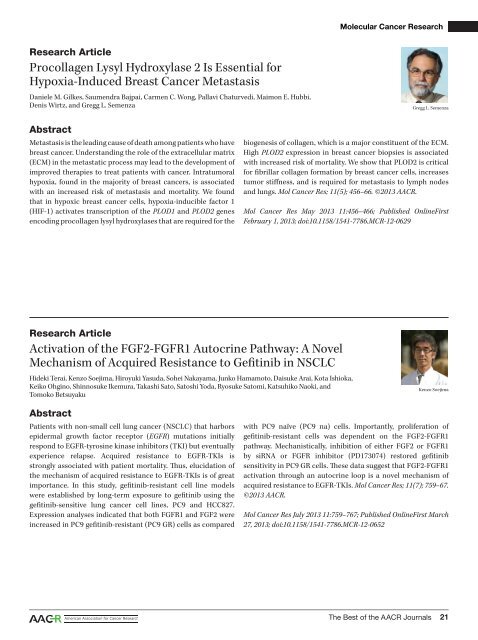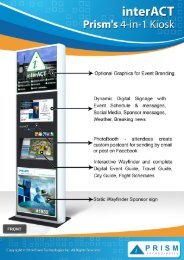Best of AACR Journals
Create successful ePaper yourself
Turn your PDF publications into a flip-book with our unique Google optimized e-Paper software.
Molecular Cancer Research<br />
Research Article<br />
Procollagen Lysyl Hydroxylase 2 Is Essential for<br />
Hypoxia-Induced Breast Cancer Metastasis<br />
Daniele M. Gilkes, Saumendra Bajpai, Carmen C. Wong, Pallavi Chaturvedi, Maimon E. Hubbi,<br />
Denis Wirtz, and Gregg L. Semenza<br />
Gregg L. Semenza<br />
Abstract<br />
Metastasis is the leading cause <strong>of</strong> death among patients who have<br />
breast cancer. Understanding the role <strong>of</strong> the extracellular matrix<br />
(ECM) in the metastatic process may lead to the development <strong>of</strong><br />
improved therapies to treat patients with cancer. Intratumoral<br />
hypoxia, found in the majority <strong>of</strong> breast cancers, is associated<br />
with an increased risk <strong>of</strong> metastasis and mortality. We found<br />
that in hypoxic breast cancer cells, hypoxia-inducible factor 1<br />
(HIF-1) activates transcription <strong>of</strong> the PLOD1 and PLOD2 genes<br />
encoding procollagen lysyl hydroxylases that are required for the<br />
biogenesis <strong>of</strong> collagen, which is a major constituent <strong>of</strong> the ECM.<br />
High PLOD2 expression in breast cancer biopsies is associated<br />
with increased risk <strong>of</strong> mortality. We show that PLOD2 is critical<br />
for fibrillar collagen formation by breast cancer cells, increases<br />
tumor stiffness, and is required for metastasis to lymph nodes<br />
and lungs. Mol Cancer Res; 11(5); 456–66. ©2013 <strong>AACR</strong>.<br />
Mol Cancer Res May 2013 11:456–466; Published OnlineFirst<br />
February 1, 2013; doi:10.1158/1541-7786.MCR-12-0629<br />
Research Article<br />
Activation <strong>of</strong> the FGF2-FGFR1 Autocrine Pathway: A Novel<br />
Mechanism <strong>of</strong> Acquired Resistance to Gefitinib in NSCLC<br />
Hideki Terai, Kenzo Soejima, Hiroyuki Yasuda, Sohei Nakayama, Junko Hamamoto, Daisuke Arai, Kota Ishioka,<br />
Keiko Ohgino, Shinnosuke Ikemura, Takashi Sato, Satoshi Yoda, Ryosuke Satomi, Katsuhiko Naoki, and<br />
Tomoko Betsuyaku<br />
Kenzo Soejima<br />
Abstract<br />
Patients with non-small cell lung cancer (NSCLC) that harbors<br />
epidermal growth factor receptor (EGFR) mutations initially<br />
respond to EGFR-tyrosine kinase inhibitors (TKI) but eventually<br />
experience relapse. Acquired resistance to EGFR-TKIs is<br />
strongly associated with patient mortality. Thus, elucidation <strong>of</strong><br />
the mechanism <strong>of</strong> acquired resistance to EGFR-TKIs is <strong>of</strong> great<br />
importance. In this study, gefitinib-resistant cell line models<br />
were established by long-term exposure to gefitinib using the<br />
gefitinib-sensitive lung cancer cell lines, PC9 and HCC827.<br />
Expression analyses indicated that both FGFR1 and FGF2 were<br />
increased in PC9 gefitinib-resistant (PC9 GR) cells as compared<br />
with PC9 naïve (PC9 na) cells. Importantly, proliferation <strong>of</strong><br />
gefitinib-resistant cells was dependent on the FGF2-FGFR1<br />
pathway. Mechanistically, inhibition <strong>of</strong> either FGF2 or FGFR1<br />
by siRNA or FGFR inhibitor (PD173074) restored gefitinib<br />
sensitivity in PC9 GR cells. These data suggest that FGF2-FGFR1<br />
activation through an autocrine loop is a novel mechanism <strong>of</strong><br />
acquired resistance to EGFR-TKIs. Mol Cancer Res; 11(7); 759–67.<br />
©2013 <strong>AACR</strong>.<br />
Mol Cancer Res July 2013 11:759–767; Published OnlineFirst March<br />
27, 2013; doi:10.1158/1541-7786.MCR-12-0652<br />
The <strong>Best</strong> <strong>of</strong> the <strong>AACR</strong> <strong>Journals</strong> 21



